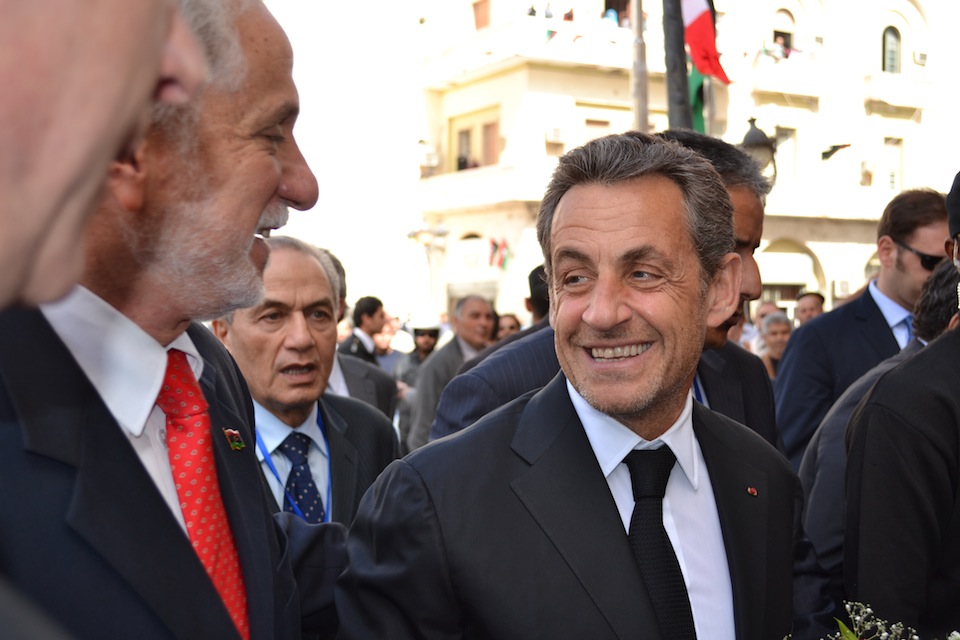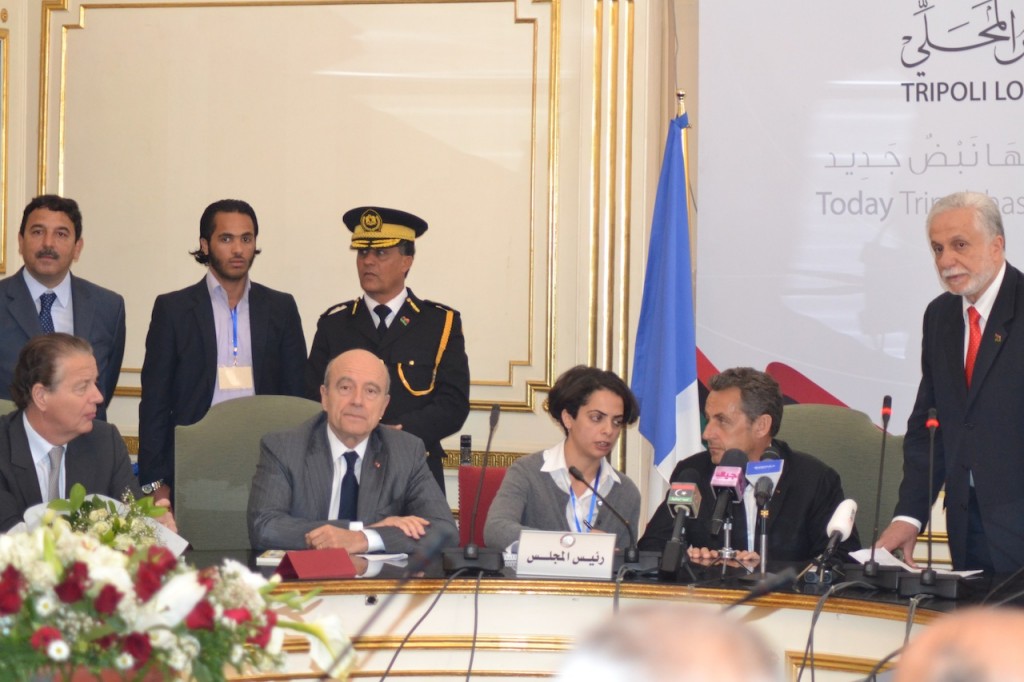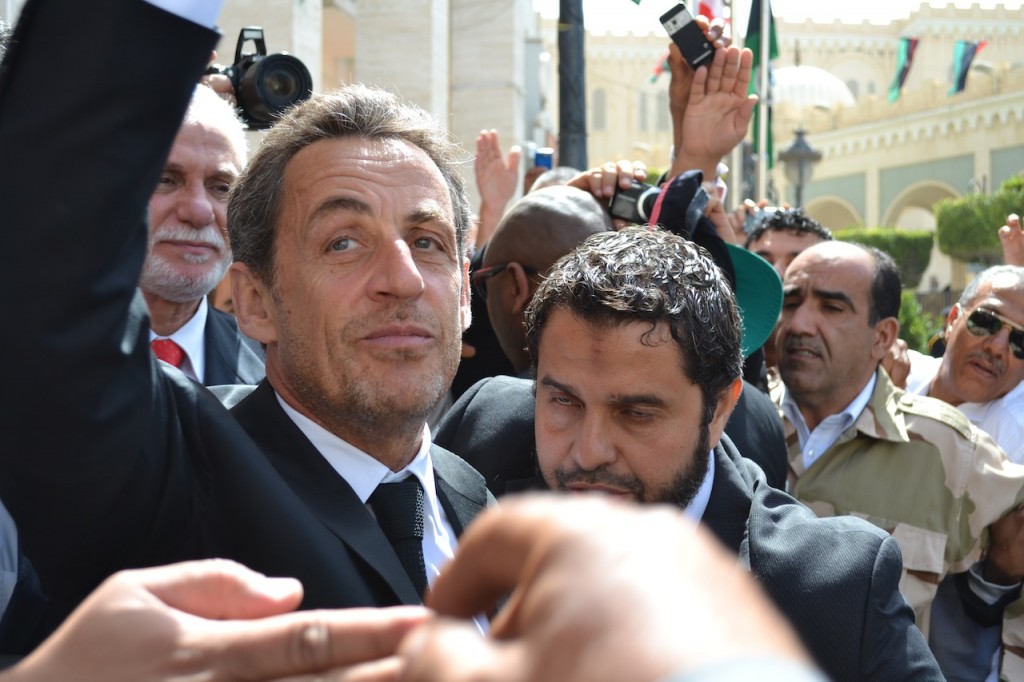By Mathieu Galtier.

Tripoli, 19 March 2013:
Former French President Nicolas Sarkozy has called on Libyans to work on reconciliation with those who . . .[restrict]supported or worked for the Qaddafi regime. He made the call at a meeting with members of Tripoli Local Council during his visit to the council’s offices in Algeria Square today, Tuesday.
He had been invited by head of the council, Sadat Elbadri, to celebrate the second anniversary of the France’s decisive entry into the war against Qaddafi’s regime.
“I will tell you, as a friend – I would say as a brother – and from the bottom of my heart, you have to achieve the reconciliation. Libya needs all its children,” he said.
“Everything cannot be forgiven, monstrosities cannot be forgotten,” he added. “But Libya needs all those who have no blood on their hands.”
The victors of the revolution were different to the Qaddafi regime, he added. “Do not treat the enemies of democracy as they treated you, because you are not like them. You embody the future of Libya.”
The former French president then gave the example of reconciliation between France and Germany after World War II. “It wasn’t easy to do but those who chose friendship between France and Germany chose the future of France and of Germany.”
The issue of reconciliation is highly sensitive at the moment and Sarkozy was seen as referring to the controversial Political Isolation Law aimed at banning former leading Qaddafi officials from holding office for the next ten years. Nonetheless, Sarkozy’s appeal was widely applauded by Tripoli local council members.

Sarkozy took advantage of the invitation to come to Tripoli remind to all Libyans (his speech was broadcasted by national TV) that he was one the few international political leaders to believe in the revolution.
“I remember the 10 March 2011 when I received NTC delegation in Paris with Alain Juppé (who was French Foreign Affairs Minister at that time and who was part of the delegation today). All the diplomats warned me not to recognize the NTC saying ‘it’s too early’, ‘we don’t know them’, ‘we don’t know if they are representative’. I remember courageous men who put themselves in danger, their families in danger. I thought myself: ‘You have no right not to take the political risk’.” He pointed out what had to those he had met that day “One is Prime minister, one is President [of the Congress] and one is Mayor of Tripoli [in fact, the leader of Tripoli Local Council].”
The latter, Sadat Elbadri, had earlier thanked Sarkozy: “Mr President, we do not forget history. The Libyan people do not forget your role in the revolution. The Libyan people do not forget the humanitarian attitude of France at the right moment. We thank the soldiers and the government (of France) which participated to the revolution. We salute a close friend of Tripoli”.
For his part, Sarkozy revealed that 19 March 2011 prompted “the most intense feelings as President of the French Republic” when he saw on TV “French tricolours on military planes in the sky of Benghazi to show clearly to Qaddafi: ‘You will not slaughter the civil population’.”
The revolution in Libya was bigger than the country, he said. Libya was setting an example for the whole Arab world. “What is going on in Libya is an essential issue: Can the Arab people build a democracy?” The whole world was watching. “You have to succeed, both for Libya and for your Arab brothers.”
He stressed the bonds between Libya and France, one of the main reasons for the French military operation: “Libya, it is in the Mediterranean area; France is in Mediterranean area. We are brothers. Our cultures have close roots. We have to understand each other.”
Following the meeting with Tripoli Local Council, Sarkozy and his delegation headed to the Mahary Radisson Blu for lunch with the Prime Minister, Ali Zeidan. It included several members of the General National Congress who, for security reasons, met him there instead of at the Congress building.
After lunch, rather than returning back to France, he and his delegation flew to Benghazi to meet with members of its local council and other leading officials. It was apparently a spur-of-the moment decision, following an invitation from Ali Zeidan to go to Libya’s second city and join in the anniversary celebrations of its rescue from the advancing Qaddafi tank force by French fighter jets.
Sarkozy was reported to have said: “How can I refuse to go, when asked by the Prime Minister?”
While in Tripoli, Sarkozy refused to talk directly to the media. He avoided making any statements about sensitive issues such as French investigation into allegations of a Qaddafi donation for his 2007 electoral campaign or his potential return to the French political arena. [/restrict]









